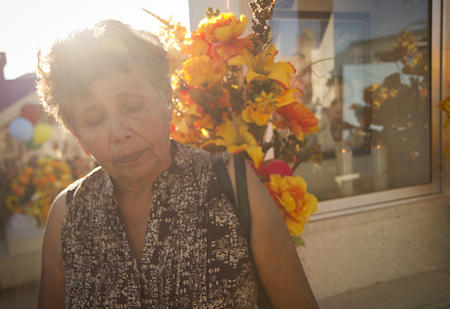On November 2, high above Nogales, Sonora at the Colinas del Buen Pastor cemetery, Taide Elena placed two lit candles on the grave of her grandson, 16-year-old José Antonio Elena Rodríguez.

“Era mi niño,” she said over and over again through tears. He was my boy. He was my boy.
Colinas del Buen Pastor was teeming with people this Day of the Dead. Several families had hired Banda and Norteño musicians to play at their burial plots. Multiple generations sat together around memorials— drinking, eating, laughing, and remembering. But Elena, mourning a death just three weeks past, came alone, left her ofrenda, or offering, cried, and walked away. The tears soon stopped but the shell-shocked expression of someone slowly working through a sudden and inexplicable tragedy held on longer. Later on that evening, you could still it in the long stares of her large, expressive eyes.
Walking to her car, Elena shared a memory of her grandson, who had been living at his grandparents’ house, just a few blocks south of where he died, for several years since the death of his father and his mother’s decision shortly thereafter to move to Navojoa, Sonora to look for work.
“What I miss most about him is that he always greeted me with a hug and a kiss when he came home,” she said. “He was very loving.”
Elena was heading back toward the port of entry, where people were starting to gather on both sides of the border for the first binational march protesting the death of her grandson. On the evening of October 10, a border patrol agent shot and killed José Antonio, who was approaching the end of his secondary education when he died. The incident is still under investigation.
Read the rest of the story at NACLA.



